The 56th Press Conference of Xinjiang Uygur Autonomous Region on Xinjiang-related Issues
(September 29, 2021, Beijing)
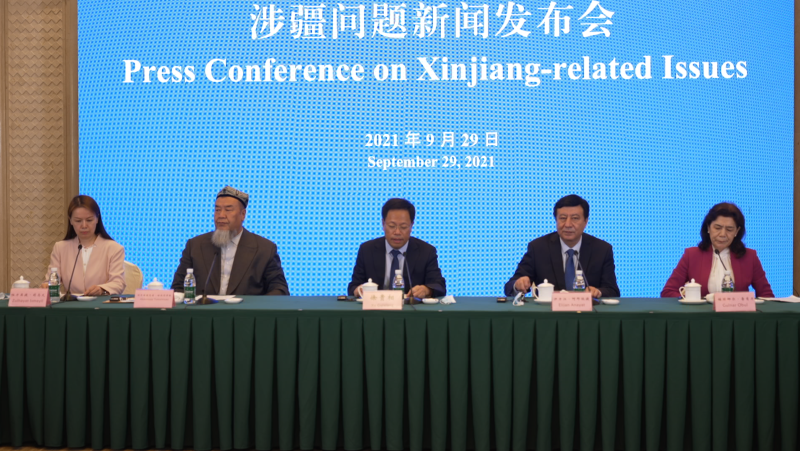
Photo taken on September 29, 2021 shows the 56th Press Conference on Xinjiang-related Issues in Beijing.
Xu Guixiang: Good morning, media friends. Welcome to the press conference of Xinjiang Uygur Autonomous Region(XUAR) on Xinjiang related issues. First of all, I would like to introduce to you the participants in today’s press conference. They are: Mr. Elijan Anayat, spokesman of the Government of XUAR, Mr. Abudurekefu Tumuniyazi, President of the Islamic Association of XUAR and President of Xinjiang Islamic Institute, Professor Zuliyati Simayi, Vice President of Xinjiang University, Ms. Gulinar Wufuli, Vice Chairman of the Science and Technology Association of XUAR.
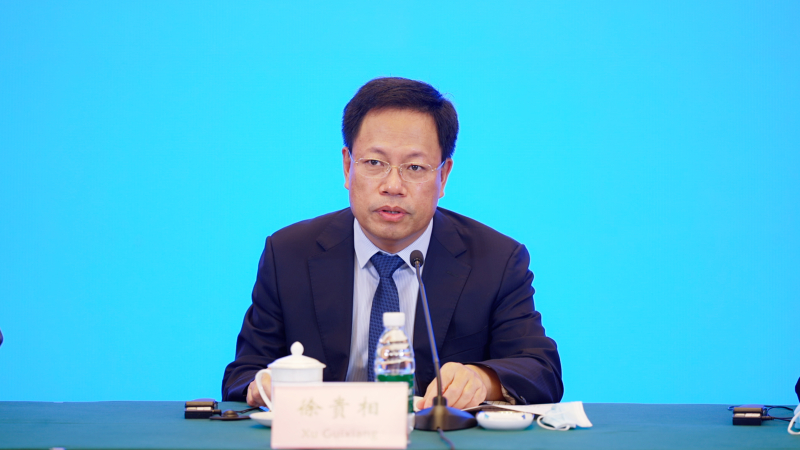
Photo taken on September 29, 2021 shows Xu Guixiang, spokesman of People’s Government of Xinjiang Uygur Autonomous Region speaks at the 56th Press Conference on Xinjiang-related Issues in Beijing.
At present, the 48th session of the United Nations Human Rights Council is being held in Geneva, Switzerland. Envoys from more than 60 countries have made speeches in sympathetic support of the human rights protection policy in Xinjiang. However, the anti-China forces in the United States and a few western countries obstinately adhere to the means of “rumor, lie and deception”, and have jointly concocted the so-called Xinjiang related picture exhibition. They continue to fabricate lies and fallacies and spread false information to deceive the international community. These platitudes run counter to the facts, legal principles and morality, and constitute a serious provocation to the bottom line of human civilization.
Behind all these rumors and fabrications lies a huge conspiracy--disrupting the development and stability of Xinjiang and impeding the great rejuvenation of the Chinese nation. However, the solid facts shattered their daydream. At present, all the area around Tianshan Mountains take a great look of stability, harmony and prosperity, which is characterized by economic development, social stability, improvement of people’s livelihood, cultural prosperity, ethnic unity, and religious harmony in Xinjiang. The people of all ethnic groups live and work in peace and contentment, fully enjoying real human rights protection.
Since the end of 2018, more than 150 groups of UN officials, foreign envoys in China, the Secretariat of the Organization of Islamic Cooperation(OIC), permanent representatives of countries in Geneva, foreign media journalists and religious groups, involving over 2,000 people from more than 100 countries and regions have visited Xinjiang. They have seen the real Xinjiang and seen through the ugly faces of anti-China forces in the United States and the west. Many insightful people have come forward to speak out. Some of them praised the effectiveness of Xinjiang’s work on the spot. Some put what they have seen and heard in Xinjiang into books to tell the world the story of Xinjiang. Some published signed articles based on objective facts in the world’s mainstream media to tell the truth of Xinjiang. Some refuted the fallacies related to Xinjiang on international multilateral occasions for the rectification of Xinjiang’s name.
In March 2019, the Council of foreign ministers of OIC in particular, adopted a resolution appreciating China’s efforts to care for Muslims. In July 2019, permanent representatives of more than 50 countries in Geneva sent a joint letter to the president of the United Nations Human Rights Council and the High Commissioner for human rights. In the letter, they positively evaluated China’s achievements in counter-terrorism, de-radicalization and the protection of human rights. In October 2019, during the meeting of the third committee of the 74th UN General Assembly, more than 60 countries made a joint statement praising the great progress of human rights in Xinjiang, China. In July 2020, at the 44th session of the UN Human Rights Council held in Geneva, Belarus made a joint statement on behalf of 46 countries in support of China’s position, measures and effectiveness on Xinjiang related issues. In October 2020, nearly 50 countries were in support of the measures taken by China in Xinjiang in The Third Committee of the 75th UN General Assembly and opposed the attacks and discredit against China by some western countries. In October 2020, envoys of 20 Arab countries and representatives of the Arab League in China visited Xinjiang. They all spoke highly of Xinjiang’s achievements in counter-terrorism and de-radicalization, protection of citizens’ freedom of religious belief, economic development, and improvement of people’s livelihood. This year, at the three meetings of human rights council, nearly 100 countries have showed their support to China’s legitimate position on issues related to Xinjiang via joint statements, individual statements and letters.
This is the voice and power of justice in human society, which should be respected and admired. Today’s press conference is to eulogize the spirit of fighting for justice, praise people with lofty ideals, and jointly build a sturdy fence against lies and deception to overcome destruction and interference. We firmly believe that justice will overcome evil, light will overcome darkness, and the future of human society will be better!
Xu Guixiang: Terrorism is the common enemy of human society and deserves the crack-down jointly done by the international community. Xinjiang has taken resolute and effective measures to crack down on terrorism, and eliminated the frequent occurrence of violent and terrorist attacks in the past, which has been highly praised by the international community. Next, I would like to invite Mr. Elijan Anayat, spokesman of the government of XUAR, to comment on the issue.
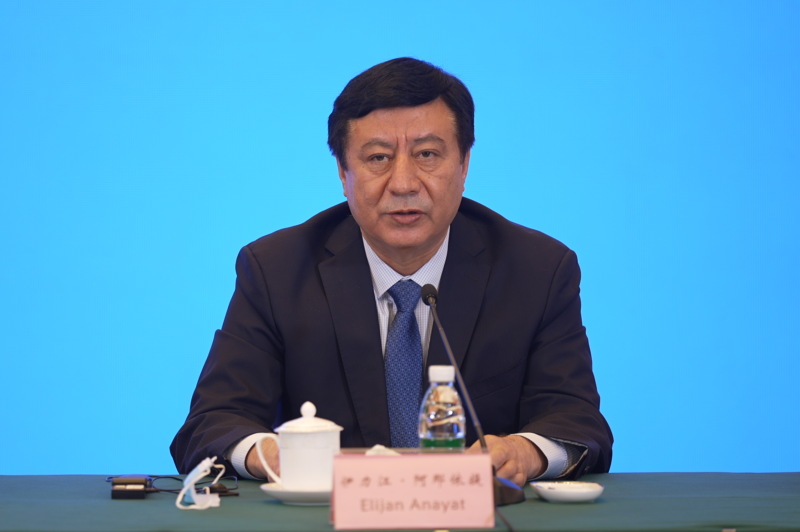
Photo taken on September 29, 2021 shows Elijan Anayat, spokesman of People’s Government of Xinjiang Uygur Autonomous Region speaks at the 56th Press Conference on Xinjiang-related Issues in Beijing.
Elijan Anayat: Through violence, destruction, intimidation and other means, terrorist forces wantonly trample on human rights, kill innocent people, endanger public security, and create social panic. They are seriously threatening world peace and security. The infiltration and spread of extremist ideas can easily lead to violent terrorist acts and pose a direct threat to people’s human rights. The Chinese government opposes all forms of terrorism and extremism, and severely crack down on any acts that advocate terrorism and extremism, organize and plot terrorist attacks and violate citizens’ human rights in accordance with the law.
Xinjiang is the forefront of China’s counter-terrorism and de-radicalization. Over some time, Xinjiang China has been seriously affected by the superposition of ethnic separatist forces, religious extremist forces and violent terrorist forces. Terrorist attacks occur frequently, causing great harm to the safety of lives and property of all ethnic groups and seriously trampling on human dignity. In the face of the severe and complex situation of frequent violent and terrorist attacks in the past, adhering to the principle of “one hand on fight, and the other hand on prevention”, Xinjiang has cracked down on violent terrorist crimes in accordance with the law, and attached importance to the source control as well. Therefore, Xinjiang has established vocational education and training centers in accordance with the law to carried out de-radicalization, so that the basic human rights of citizens are protected to the greatest extent from terrorism and extremism.
In response to the false accusation made by the anti-China forces in the United States and a few western countries that Xinjiang’s counter-terrorism and de-radicalization measures are “suppressing ethnic minorities”, the international community generally believes that Xinjiang’s counter-terrorism and de-radicalization has achieved significant results, and accumulated plenty of experience which is worth learning. Since the end of 2018, most of foreign visitors to Xinjiang have visited the Xinjiang counter-terrorism and de-radicalization key case exhibition in Xinjiang International Convention and Exhibition Center and learned a lot of details about the cases. They were shocked by the frequent occurrence of violent terrorist attacks in Xinjiang in the past, indignant at the bloody picture of innocent people being mutilated, and angry at the inhuman crimes of the “three forces”. They fully approved the urgency, necessity, legitimacy and rationality of preventive counter-terrorism and the establishment of vocational education and training centers in Xinjiang. They condemned the false accusations of the United States and a few western countries against the counter-terrorism and de-radicalizaiton in Xinjiang, and believed that the United States and a few western countries should objectively look at the effectiveness of de-radicalizaiton in Xinjiang and reflect on their own faults in dealing with terrorism. For example, in September 2019, Admiral Jayanath Colombage, director of the Sri Lanka India Relations Research Center of the Pathfinder foundation of Sri Lanka, visited Xinjiang and said, “what I have seen is that Xinjiang is very calm and the people there live a happy life. Foreign countries should not try to intervene in Xinjiang related issues.” for example, on September 6, 2019, at the international seminar “counter-terrorism, de-radicalization and human rights protection” sponsored by the China Human Rights Research Society, Predrag Marković, Vice Chairman of the Serbian Socialist Party and director of the Serbian Institute of Contemporary History, said in an interview with the Global Times, “some countries criticized China’s counter-terrorism policy in Xinjiang, but what would the United States do if hundreds of Americans died in terrorist attacks? We have seen the answer. The United States chose to blow up two or three countries. But China chose a more peaceful policy. They educated the people and provided jobs for them. They chose to rebuild a new society(to combat terrorism).”
Now, please watch a video clip.
For another example, on December 21, 2019, the US independent news website Grayzone published an article saying that the data of “1 million Uygurs were detained by the Chinese government” was first concocted and then spread by a non-governmental organization China Human Rights Defenders(CHRD) supported by the US government and headquartered in Washington. CHRD interviewed with eight Uygurs and made rough estimates, and then came to the absurd conclusion that “10% of 20 million people in Xinjiang were detained in ‘re education camps’ and 20% were forced to participate in reeducation in villages or towns”.
Now, please look at the pictures.
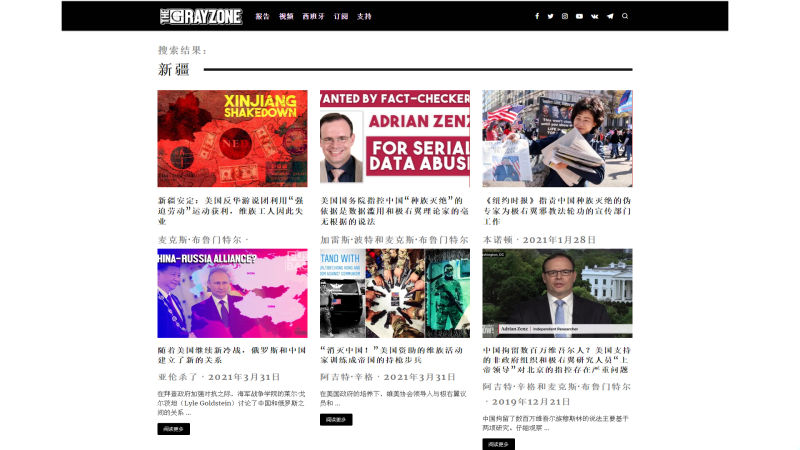
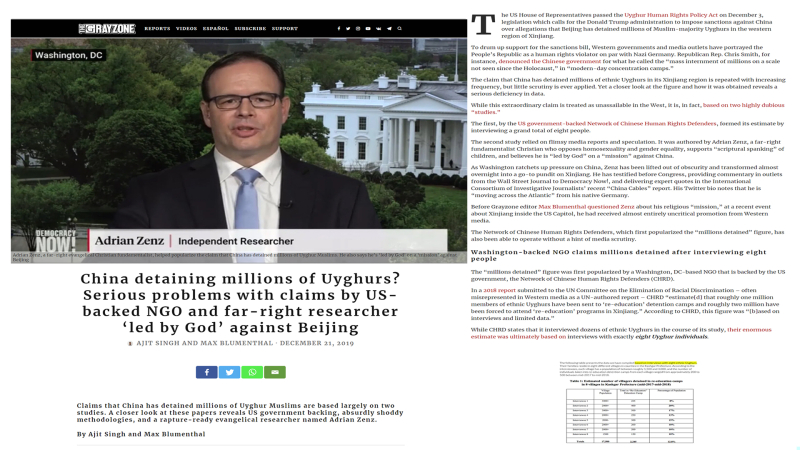
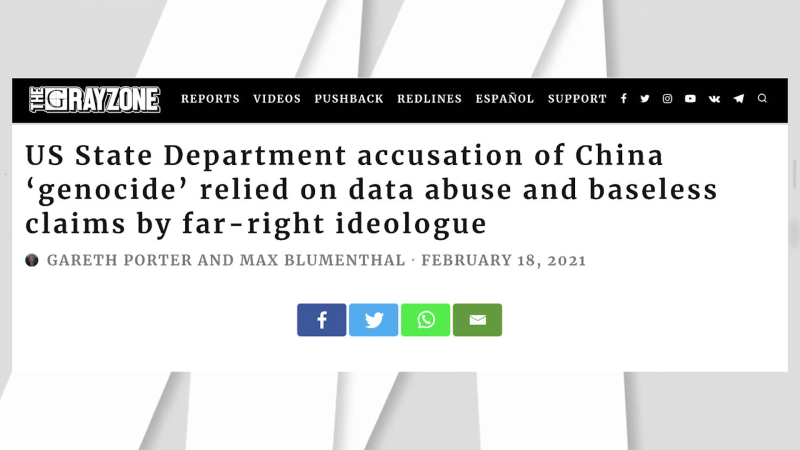
For another example, on December 18, 2020, the World Communist Parties (WWP) published an article at its website entitled Behind the U.S. Anti-war: Facts about Xinjiang written by American anti-war activist Sarah Flanders, saying that China has solved the problem of religious extremism by establishing vocational education and training centers in large scale and most countries in the world support Xinjiang’s counter-terrorism and de-radicalization measures. For example, from March 30 to April 2, 2021, ambassador of Iran to China Mohammed Kshawarzzad visited Xinjiang. After visiting the exhibition of key cases of counter-terrorism and de-radicalization in Xinjiang, he said, “I think the international community should work together to combat the ‘viruses’ of terrorism, separatism and extremism.” for example, the U.S. Project Syndicate and The Australian Alert Service, a weekly publication of the Australian Citizens Party published articles saying that the underlying color of China’s policy of governing Xinjiang is counter-terrorism. In recent years, religious extremism has been eradicated by means of vocational education and training and providing employment opportunities. China has not launched anti-terrorism war to hurt innocent people like the United States. The West should reflect on its shortcomings in coping with the terrorist threat by learning from China’s counter-terrorism practice. The West selectively kept silent on terrorism almost out of control in Xinjiang and deliberately wiped out China’s counter-terrorism achievements. The United States has promoted the removal of ETIM from the list of terrorist organizations in an attempt to deprive China of the international legitimacy of its counter-terrorism efforts.
Xu Guixiang: Thank you. The anti-China forces in the United States and a few western countries falsely allege that Xinjiang has carried out “genocide”, which is a absurd fabrication and has also aroused strong opposition from the international community. Professor Zuliyati Simayi, vice president of Xinjiang University will comment on it.
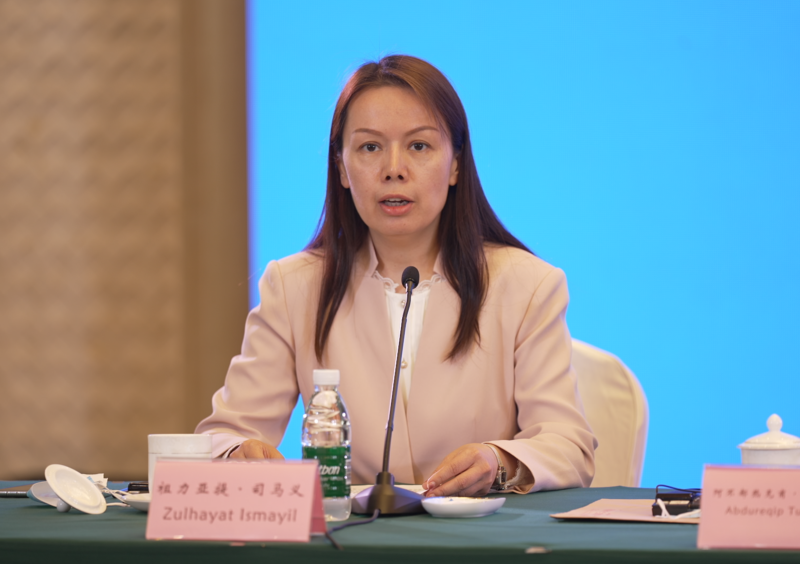
Zuliyati Smayi: Recently, based on the lies and false information of some anti-China forces, the United States and a few western countries have falsely asserted that there is “genocide” in Xinjiang, China. This is an absurd century lie, an insult and infringement to the people of all ethnic groups in Xinjiang, and a serious trample on international law and the basic norms of international relations. It must be pointed out that there are very strict legal, evidentiary and procedural standards for the constitution of “genocide”, which can not be determined by the subjective imagination of some countries, organizations and people. The anti-China forces in the United States and a few western countries maliciously label Xinjiang as “genocide” based on lies. Their purpose is to disrupt Xinjiang with lies, crack-down and sanctions, so as to repeat the tragedy of frequent violence and terrorism in Xinjiang and achieve their goal of “containing China with Xinjiang”. According to the data of the seventh national census, the population of Xinjiang and the population of ethnic minorities, including Uygurs, have maintained a steady growth in the past 10 years. Is there a “genocide” which maintains a sustained population growth in the world?
In response to the false accusations of “genocide” in Xinjiang made by the anti-China forces in the United States and a few western countries, the international community generally believes that the evidence of the so-called “genocide” accusations in Xinjiang made by the United States and the west is insufficient and has no factual basis. They should not blindly accuse Xinjiang China, but reflect on themselves. For example, in early 2021, Foreign Policy, a U.S. magazine, said in a publication that the office of the Legal Adviser Office of the U.S. State Council concluded in early 2021 that there was not enough evidence to determine the existence of the so-called “genocide” in China. Using the term “genocide” without a solid legal basis has a risk of “politicizing” and “eroding” it. For example, on March 15, 2021, the ruling coalition of Australia led by the Liberal Party and the main opposition parties jointly opposed a motion on the Australian government’s false accusation of “genocide” in Xinjiang China by 33 votes to 12 votes in the Senate. For example, on June 9, 2021, Singapore’s Lianhe Zaobao published a commentary entitled On the Genocide written by former parliament member of Singapore Wu Jungang, saying that although the “multinational coalition forces” of western countries are full of firepower, the relevant “evidence” they have is very limited, just some so-called leaked documents, and the one-sided words of some Uygur dissidents in exile. It is difficult to win trust.
Now, please look at the pictures.
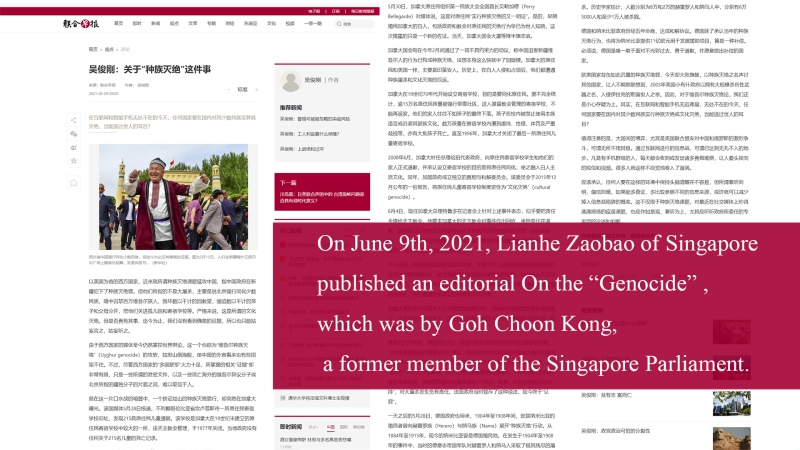
Singapore’s Lianhe Zaobao published a commentary entitled On the Genocide
For example, in June 2021, Graham Perry, a British human rights lawyer and arbitration expert, said in an interview with the Global Times that the accusation of “genocide” in Xinjiang made by the United States and some western countries against China is groundless. This is not a legal issue, but a political issue with an obvious anti-China purpose. Graham Perry also released the Xinjiang related report China and Uygurs on his personal website, saying that the arguments concocted by the BBC and other media and anti-China scholars such as Adrian Zenz that “Uighur women are sterilized” and “one million Uygurs are detained” lack evidence.
Now, please watch a video clip.
For another example, Former United Nations Senior Expert on Human Rights, Zayas, and Honorary Professor of International Law, Princeton University, Farke, published a joint article Reflection on the Ultimate Crime--Genocide on the United States independent website. In the article, they pointed out that the “genocide” accusation against Xinjiang is driven by ideology and has no proof to back it. It will damage the authority and credibility of the United States in turn. For example, the Swiss Foundation for Peace and Future Research and the U.S. independent website Counterpunch pointed out that the allegations of “genocide” in Xinjiang have obvious political tendentiousness and lack evidence. For example, Shan Weijian, a Singaporean scholar, published an article entitled Xinjiang: China’s Counter-terrorism War that the Western World did Not Tell You, saying that the U.S. counter-terrorism war in Afghanistan and Iraq killed 500,000 people and more in Pakistan, Syria and Libya. In Iraq, 200,000 civilians were killed, five times the number of military deaths, most of them women and children.
Next, please look at the pictures.
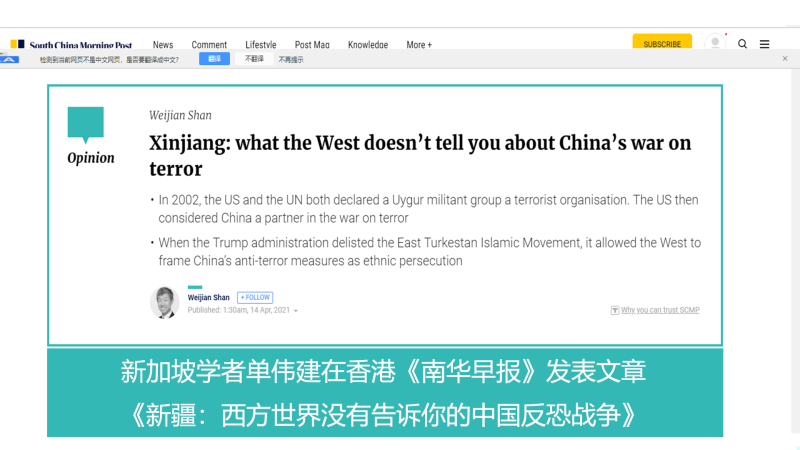
For another example, Jeffrey Sachs, a professor at Columbia University of the United States, William Schabas, a professor of Law at Middlesex University of the United Kingdom, jointly published an article entitled The Xinjiang Genecide Allegations Are Unjustified pointing out that the U.S. government has escalated its accusations against China for no reason in recent years and falsely claimed the so-called “genocide” against ethnic minorities in Western China. They are all false accusations and frame ups. The United States should reflect on its own historical “genocide debts”. The U.S. history of the “wild west” expanding from the east coast to the west coast is the history of the massacre of the indigenous peoples of North America. The U.S history of just over 200 years is imbued with so many crimes of massacre and slavery. What qualifications does the United States have to criticize other countries?
Xu Guixiang: Thank you. Employment is the most effective way to solve the problem of poverty. One family member’s employment can often lift the whole family out of poverty. Through the implementation of active labor and employment policies, Xinjiang has helped the people of all ethnic groups out of poverty and live a happy life. However, the anti-China forces in the United States and a few western countries falsely claim that there is “forced labor” in Xinjiang and use this as an excuse to impose sanctions on relevant industries and enterprises in Xinjiang. What does the international community think about this? Next, let’s invite Ms. Gulinar Wufuli, Vice President of the Science and Technology Association of XUAR, to comment on this Issue.
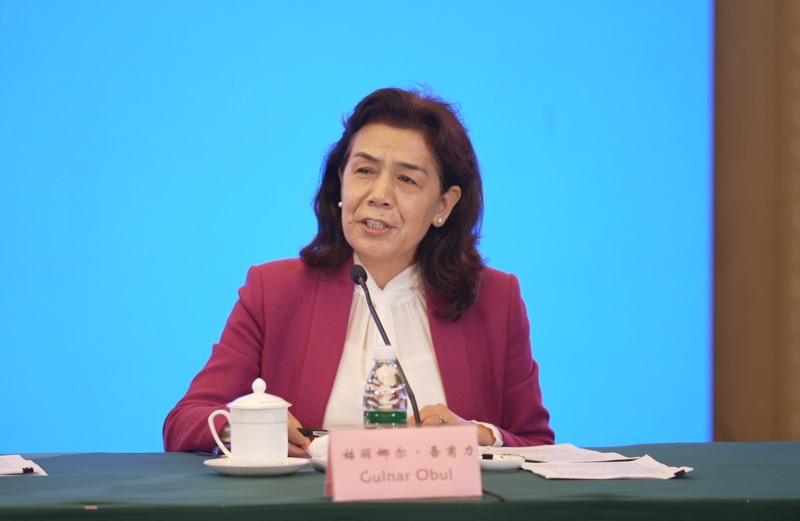
Photo taken on September 29, 2021 shows Gulinar Wufuli, Vice President of the Science and Technology Association of XUAR speaks at the 56th Press Conference on Xinjiang-related Issues in Beijing.
Gulinar Wufuli: In recent years, in order to resolutely win the battle against poverty, in view of large rural surplus labor force, limited employment and difficulty for people to shake off poverty and have a well off life in some places in Xinjiang, Xinjiang has implemented the employment priority policy, continuously expanding the scale of employment and endeavoring to help the poverty-stricken people of all ethnic groups shake off poverty and increase their income. The transfer of urban and rural surplus labor force in Xinjiang has always followed the principle of voluntariness and does not force anyone. According to incomplete statistics, the per capita annual income of transferred workers from Xinjiang working in the inland provinces is about 40000 yuan, which is basically equivalent to the disposable income of local urban permanent residents. The per capita annual income of transferred workers within Xinjiang is about 30000 yuan. From the meagre food in the past to the nutritious diet at present and from the barely affordable goods yesterday to those that have become the daily necessity today, quality of life of all ethnic groups has been greatly improved. There is no doubt that the people of all ethnic groups in Xinjiang are working with dignity in the sun and creating their own happy life. However, borrowing the banner of human rights, some people in the United States and a few western countries maliciously hype the so-called “forced labor” in Xinjiang. Their fundamental purpose is to deprive the people of all ethnic groups in Xinjiang of their legitimate labor rights and plunge the people of all ethnic groups into poverty, isolation and backwardness, so as to disrupt Xinjiang’s stable development and realize their conspiracy of “containing China with Xinjiang”.
In response to the accusations of so-called “forced labor” against Xinjiang by anti-China forces, the international community generally believes that such accusations are groundless and can not stand the test. On the contrary, the United States and a few western countries have serious “dark history” and “ugly reality”, such as trafficking in black slaves. They are countries where forced labor really exists. For example, from March 30 to April 2, 2021, the Secretary General of the Shanghai Cooperation Organization, Vladimir Norov, and more than 30 envoys and diplomats of 21 countries to China visited Xinjiang. In Aksu Huafu Textile Factory, machines are in operation and the workers are skillfully spinning on the machines. Zeynalli Akram, Azerbaijani ambassador to China, said: “I have see that the cotton processing equipment is very advanced, and the living conditions and dormitory building conditions of employees are very good, which gives me a very positive impression.” Mahendra Bahadur Pandey, Nepalese ambassador to China, said: “I didn’t see any ‘forced labor’ in this textile enterprise in Aksu. I saw that the employees enjoyed full freedom, and the food and accommodation conditions were very good.”
Now, please watch a video.
For another example, Gao Yousi, a well-known video blogger from Israel, lives in China all the year round. In an exclusive interview with Xinhua News Agency on April 13, 2021, he described his personal experience in Xinjiang and refuted the unwarranted accusation of “forced labor” in Xinjiang by some western countries with what he saw, heard and personal feelings. He said: “Xinjiang has had a cotton growing tradition since ancient times. People in Xinjiang are not suddenly forced to grow cotton. Moreover, they do much better than anyone else in growing cotton."
Now, please watch a video clip.
For another example, on July 14, 2021, at the online video seminar on Xinjiang Is a Wonderful Place--The Gateway of The Silk Road, Michele Geraci, former Vice Minister of the Italian Ministry of Economic Development and an economist, described his visit in Xinjiang and showed the photos and videos he shot during his visit in May. He said that “forced labor” and other accusations are completely inconsistent with the facts. The lies are to create trouble for China with Xinjiang issues. He said, I am an economist and with the economic data I have and the actual situation I have observed, there can’t be “forced labor” in Xinjiang.
Now, please watch a video clip.
Xu Guixiang: Thank you. Xinjiang has always been adhering to equality among all ethnic groups and attached great importance to protecting the legitimate rights and interests of the people of all ethnic groups. However, the anti-China forces in the United States and a few western countries falsely claim that there is “ethnic oppression” in Xinjiang, which is disapproved by international community. Next, I would like to invite Mr. Elijan Anayat, spokesman of the Government of XUAR, to comment on this issue.
Elijan Anayat: Xinjiang has always been a multi-ethnic area. Correctly handling ethnic relations and effectively strengthening ethnic unity are of great significance to maintaining social stability and long-term stability in Xinjiang. In Xinjiang, all ethnic groups, regardless of their population, length of history, development level and customary differences, have equal status and enjoy the rights to the participation into the state affairs management, freedom of religious belief, education, using their own language and inheriting their own traditional culture. There is no “suppression” at all. For a long time, some anti-china forces in the United States and a few western countries have falsely claimed that there is so-called “ethnic oppression” in Xinjiang in an attempt to provoke ethnic dissensions and create instability.
However, many insightful people of the international community have witnessed the objective fact of the harmonious coexistence of all ethnic groups in Xinjiang and believe that there is no factual basis for the anti-China forces of the United States and a few Western countries to accuse Xinjiang of so-called “ethnic oppression”. For example, Rahamtalla M. Osman, the representative of the African Union in China, said in his visit in Xinjiang from September 9 to 12, 2019, “This is my first visit to beautiful Xinjiang. I’m glad to see that all ethnic groups live and work in harmony here. The development of Xinjiang is impressive.” Martin Mbazoumutima, a Burundi ambassador to China, said in this visit, “We have seen that Xinjiang has taken many measures to promote ethnic unity and maintain social harmony. Xinjiang has made positive progress, and vigorously promoted the development of cultural undertakings, which is conducive to ethnic unity and will have a positive impact on national development.”
Now, please watch a video clip.
For another example, on June 14, 2021, Russian President Vladimir Putin told NBC that the ethnic policy implemented by the Chinese government was generally welcomed by the Uygur people, who believed that the government had done a lot of practical things in Xinjiang.
Xu Guixiang: Thank you, Mr. Elijian Anayat. Respecting and protecting freedom of religious belief is the basic spirit of China’s constitution and laws. Religious relationship in Xinjiang is harmonious. There is no so-called “persecuting Muslims” by anti-China forces in the United States and a few western countries, and the international community also gives positive comments. Mr. Abudurekefu Tumuniyazi, President of the Islamic Association of XUAR and President of Xinjiang Islamic Institute will comment on this issue.
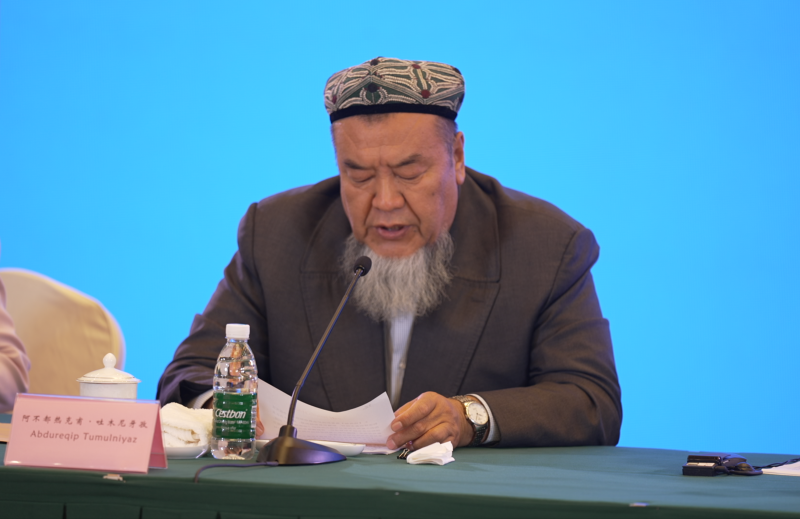
Photo taken on September 29, 2021 shows Abudurekefu Tumuniyazi, President of the Islamic Association of XUAR and President of Xinjiang Islamic Institute speaks at the 56th Press Conference on Xinjiang-related Issues in Beijing.
Abudurekefu Tumuniyazi: Xinjiang fully implements the policy of freedom of religious belief and guarantees the normal religious activities and religious needs of religious believers in accordance with the law. In Xinjiang, all legal religious activities carried out by religious believers in religious places and in their homes in accordance with religious customs, such as worshiping, fasting and religious festivals, are conducted by religious organizations and religious believers themselves and protected by law. No organization or individual shall interfere. Xinjiang has never banned Muslims from fasting in the holy month of Ramadan. It is up to individuals to decide whether to fast or not. In recent years, the conditions of religious sites in Xinjiang have been continuously improved. The government has funded the implementation of “seven accesses and two haves” (tap water, electricity, road, gas, information, radio and television, cultural book houses, and bathing facilities and water flushing toilets for the Jumah mosques), and “nine fittings” (medical services, electronic display screen, computer, electric fan or air conditioner, fire-fighting facilities, natural gas, drinking water equipment, shoe cover or shoe cover machine, lockers) for mosques, which has greatly facilitated religious personages and believers. At present, there are 10 religious institutions in Xinjiang, including Xinjiang Islamic Institute and its 8 branches and one Islamic Scriptures School. They recruit nearly 1000 students every year and have formed a relatively complete Islamic education and training system. The religious classics including The Koran, and The Essence of Buhari’s Sermon have been translated and published in Chinese, Uygur, Kazak, and Kirgiz, and the channels for religious believers to acquire religious knowledge have been continuously increased, which ensures the healthy and orderly inheritance of Islam.
On November 3, 2020, Xinjiang Islamic Association released The Report on Freedom of Religious Belief in Xinjiang, which offers a comprehensive introduction. On May 13, 2021, the Government of XUAR held a reception for Rouzi Festiva in Beijing. Five religious figures and I extended greetings to Vladimir Norov, Secretary General of the Shanghai Cooperation Organization, 10 ambassadors and 11 senior diplomats from 18 countries such as Syria, Iran, Bahrain, Palestine, Algeria, Sierra Leone and Bangladesh, as well as 26 foreign media stationed in Beijing and briefed to them the protection of the right to freedom of religious belief of the people of all ethnic groups in Xinjiang in accordance with law, the continuous improvement of mosque conditions, the healthy and orderly inheritance of Islam, the continuous expansion of ways for Muslims to obtain religious knowledge, and the normal development of religious activities in Ramadan. On July 14, 2021, the white paper Respecting and Protecting the Rights of All Ethnic Groups in Xinjiang issued by the Information Office of the State Council also introduced in detail the protection of the right to the freedom of religious belief in Xinjiang. All these have shown the world a real Xinjiang where the right to freedom of religious belief is fully realized, normal religious activities are carried out in order, and religious extremism is curbed.
In response to the so-called “persecution of Muslims” in Xinjiang claimed by the anti-China forces of the United States and a few western countries, the international community generally believes that the freedom of religious belief in Xinjiang is fully guaranteed and the harmonious coexistence of religions is an objective fact. They have praised Xinjiang’s efforts in protecting the freedom of religious belief and condemned the false accusations of the United States and the West. For example, during a visit to Xinjiang from January 9 to 16, 2019, Sihab Rahman, executive editor of Daily Sun, a newspaper in Bangladesh, said, “before I came to Xinjiang, I heard that the Chinese government did not allow Muslims to worship, but we found that the government did not interfere with normal religious activities, and the freedom of religious belief of Muslims in Xinjiang was effectively protected.” for example, From February 22 to 27, 2019, Yuhana Margarita, producer and host of Indonesian Metro TV, said, “I have seen Xinjiang (Id Kah) mosque has perfect infrastructure and beautiful environment. I am surprised and amazed that local Muslims can carry out religious activities in such a good environment. I also appreciate the Chinese government’s effort for repairing these religious places and providing such good religious places.” For example, from July 14 to 22, 2019, Khalid Salih, editor in chief of the current political edition of Fatherland, a newspaper in Saudi Arabia, said: “I think Chinese Muslims enjoy full freedom of religious belief. Unlike what some media say, ‘some people oppress and interfere with Chinese Muslims’ worship’, no one here has been interfered with, and they all enjoy full freedom.” for example, from December 25 to 27, 2019, Ambassador Iya Tijani, permanent representative of Cameroon to the OSC, said during his visit to Xinjiang: “there are a large number of mosques in Xinjiang, which can fully meet the needs, and the Muslim people in Xinjiang enjoy freedom of religious belief.” For example, during his visit to Xinjiang from March 30 to April 2, 2021, ambassador of Iran to China Mohammed Kshawarzzad said, “I have seen that people of all ethnic groups in Xinjiang freely engage in religious activities, and the reports of western anti-China media on Xinjiang are groundless. It is very important to see all this with your own eyes.” For example, on April 17, 2021, The Nation, a Pakistan newspaper published an article entitled Ramadan Shines In Xinjiang written by columnist Yaser Habib Khan who points out that Muslims in Xinjiang can freely hold religious ceremonies, including worshiping, suhoor meals and iftar meals, and night worship, and Uygur Muslims in Xinjiang can freely exercise their religious rights in Xinjiang and other parts of China. For example, Mujiasid Yusuf, Minister of religious affair section of the prime minister’s office of Malaysia, said, “The Chinese government has invested a lot in the construction of Xinjiang Islamic Institute, which has done significant work in cultivating Islamic staff and has promoted unity accordingly. Malaysia is doing the same.”
Now, please watch a video clip.
Xu Guixiang: Xinjiang’s prosperous, stable and peaceful social situation can not be pretended. The anti-China forces in the United States and a few western countries have described Xinjiang as a messy dark place out of their ulterior motives. Many people who have visited Xinjiang have smashed those lies and fallacies with their own experience and what they have seen. I would like to brief it.
Xu Guixiang: Over the years, Xinjiang has taken the people’s yearning for a better life as its goal, and made unprecedented achievements in the socioeconomic development and the improvement of people’s livelihood in Xinjiang. People of all ethnic groups have found their sense of fulfillment, happiness and security continuously enhancing. For example, we adhere to the basic strategy of targeted poverty alleviation, focus on “Two Assurances and Three Guarantees”--to assure food and clothes and guarantee compulsory education, basic medical care, and housing safety, and take a series of effective measures to win the battle against poverty. Under the current standard in Xinjiang, 3.0649 million poverty-stricken people have been lifted out of poverty, 3,666 poor villages have shaken off poverty, 35 poor counties have been removed from the lists of poverty-stricken counties, and the Millennium absolute poverty problem has been solved historically. For example, we have accelerated the construction of a comprehensive transportation system, and realized “transportation ring available within Xinjiang and fast transportation from and to Xinjiang”. The railway operation mileage has reached 7399 kilometers, and all prefectures and cities in Xinjiang are connected by railway. The mileage of expressway has reached 209,000 kilometers, all prefectures and cities have entered the era of expressway, and nearly 75% of counties and cities have access to expressway (class I). Civil airports has totaled 22, ranking first in all provinces (regions and cities) in China. The “Air Silk Road” with Urumqi International Airport as the core and regional airports as the support has begun to take shape. For example, in the past five years, Xinjiang has more than 4200 China Europe trains in operation, reaching 26 cities in 19 countries in Asia and Europe, which has formed a multi-spotted and multi-directional train operation pattern. In the first half of this year, there were 6106 China Europe trains in operation in Xinjiang. On average, there is one China Europe train drawing in and out of Xinjiang port within 43 minutes. For example, Keping County in Aksu Prefecture is full of Gobi with little precipitation. People of all ethnic groups used to drink groundwater with high salinity and alkalinity for a long time, which seriously affected their health. In October 2018, we invested more than 600 million yuan in the urban and rural drinking water safety project in Keping County, and 56,000 people in the county have got access to safe and clean tap water and no longer drink “brackish water”. These are all that are beyond the imagination of people of all ethnic groups, but now they have really been put into reality.
In response to the false accusations of the anti-China forces of the United States and a few western countries, the international community generally believes that Xinjiang’s achievements in stable and harmonious development are obvious to all and admirable. For example, Ambassador Bagley, permanent observer of OIC in Geneva, said, “I feel very good in Xinjiang! People here live a happy life and people of all ethnic groups live in harmony. I am ready to live here after my retirement.” For example, Sri Lanka’s ambassador to China Kodituwaku said, “I have visited nearly 30 provinces in China. I did not expect that Xinjiang, an area that has been frequently disturbed by terrorist attacks, has such rapid economic development and advanced high-speed rail and urban construction. Through what I have seen and heard and my direct exchanges with the local people, I deeply feel that in Xinjiang, a multi-cultural region, the people live and work in peace, contentment, and unity. They respect each other with positive outlook. This thriving multicultural scene is amazing.” For example, Burundi Ambassador Martin Mbazumutima said after his visit in Xinjiang, “I see that Xinjiang is no longer a turbulent area with frequent terrorist incidents, rampant extremism and estrangement of ethnic relations, but an area with rapid economic development, unity and optimism, social harmony and stability, and prosperity. It has become a model in all aspects for African countries to learn from.” For example, from June 18 to 21, 2019, Ambassador kichades, the permanent representative of Laos in Geneva, said, “Before I came here, I heard a lot of rumors about Xinjiang. Just as the proverb goes, seeing it with my own eyes once is more effective than listening to it ten times. I have seen the people of all ethnic groups in Xinjiang live in harmony. They are very happy, like hundreds of flowers in full bloom. I appreciate it very much. The representatives from all walks of life in the world should come to see what has happened in Xinjiang and refute the rumors with what they have seen.” For example, in his book Ouïghours, pour en finir avec les fake news released in January 2021, the French writer Maxime Vivas described in detail his two visits to Xinjiang and the local prosperity and stability.
Now, please watch a video clip.
For another example, from March 30 to April 2, 2021, Sobah Rasheed, Deputy Ambassador of the Maldives Embassy in China, said, “during my visit in Xinjiang, I was deeply impressed by the changes in people’s life in Xinjiang. I saw that people were satisfied with the economic progress and that people of all ethnic groups were living and working in peace and contentment.” For example, in March 2021, in Nation, a Seychelles newspaper, a report entitled Significant Progress has Been Made in China’s Counter-terrorism and De-radicalization Preventive Measures in Xinjiang was published. The article said that by taking preventive measures against terrorism and extremism in accordance with the law, continuous progress has been made in the economy of Xinjiang, China, people’s living standard, and unit among all ethnic groups, and that all religions in Xinjiang coexist harmoniously. From a historical point of view, the absolute poverty in Xinjiang has been completely solved. With the continuous socioeconomic development of Xinjiang, living conditions of the people of all ethnic groups in Xinjiang have been fundamentally improved. For example, in April 2021, Pakistani ambassador to China Moin ul Haque said in an interview with China Media Group, “Xinjiang takes on a vigorous prosperous look. The streets are bustling, the residents live and work in peace and contentment, the culture is thriving and diverse, and the people of all ethnic groups coexist harmoniously. There is no depression and sorrow depicted by the western media. Any insightful person who comes forward to speak honestly on issues related to Xinjiang will be sniffed at by the western media."
Now, please watch a video clip.
In April this year, CGTN interviewed Vladimir Norov, Secretary General of the SCO when he visited Xinjiang. In the interview, he said, “the development of Xinjiang is obvious to all, and everyone has seen it. How can such an economically prosperous region, such an open region be closed, and how can it hide anything?” Secretary General Vladimir Norov offered a representative view which reflects the common views of many insightful people.
Xu Guixiang: Xinjiang attaches great importance to the excavation, inheritance and protection of the excellent traditional culture of all ethnic groups, and forms a new atmosphere in the promotion of the prosperity and development of all ethnic cultures. However, the anti-China forces in the United States and a few western countries falsely accused Xinjiang of “eliminating minority culture”, and the international community has different views on this. Next, let’s invite Ms. Gulinar Wufuli, Vice President of the science and Technology Association of XUAR, to comment on this issue.
Gulinar Wufuli: Since ancient times, Xinjiang has been a place where many ethnic groups have migrated and lived together, and it is also a stage for multi-cultural exchanges and integration. The excellent traditional culture of all ethnic groups in Xinjiang breeds and grows in the embrace of Chinese culture, which is an important part of Chinese culture. While inheriting and carrying forward Chinese culture, Xinjiang attaches great importance to the excavation, inheritance and protection of the excellent traditional culture of all ethnic groups, and has formed a new atmosphere in the promotion of the prosperity and development of all ethnic cultures. For example, Xinjiang Uygur Muqam of Xinjiang and the Kirgiz epic Manas were registered on the “UNESCO Representative List of the Intangible Cultural Heritage of Humanity”, and Uygur Meshrep on the “List of Intangible Cultural Heritage in Need of Urgent Safeguarding”. All ethnic groups have their own representative intangible cultural heritage projects listed in the intangible cultural heritage list at the national and autonomous region level. The excellent cultural traditions of all ethnic groups have been inherited and developed. Among popular folk festivals are the Han people’s Lantern Festival, the Uygur’s Meshrep, the Kazak’s Aytes, the Kirgiz’s Kobuz Ballad Singing Fair, the Mongolian Nadam Fair, and the Hui people’s Hua’er Folk Song Festival. The traditional sports of all ethnic groups have made great progress. Different forms of sports meetings are held everywhere. Traditional sports competitions and performances with ethnic characteristics, such as wrestling, horse racing, archery, Buzkashiand Dawazi, are also held on traditional festivals. The people of all ethnic groups participate in the sports, competing on the same court, learning from each other and enjoying themselves.
In response to the accusation of anti-China forces against Xinjiang that there is a so-called “elimination of ethnic minority culture”, the international community generally believes that these arguments run counter to the fact of the prosperity and development of Xinjiang’s culture. For example, during the seventh season of “Silk Road Celebrities’ Trip to China” from January 9 to 16, 2019, mishkat Dikman, President of the Izmir Journalist Association of Turkey, said, “Xinjiang has done very well in protecting and promoting minority culture, and more people will understand the diversified and integrated culture of China in the future.” for example, in the theme interview of the event “Entering the Core Area of the Silk Road Economic Belt” held in Xinjiang from July 14 to 22, 2019, Sasha Prudipak, Chairman of Thailand’s online media www.salika.co, said, “the Chinese government is protecting the traditional culture of ethnic minorities, such as dance and music performances we have enjoyed. This is a very good practice, which proves that China is indeed protecting the inheritance of traditional culture.” Said Jawad, head of the news television network of the Indian Embassy, said, “Xinjiang is an area where many cultures coexist, and the culture here has really broadened our vision. For example, in February 2021, Admiral Jayanath Colombage, foreign secretary of Sri Lanka, said in an interview with Xinhua News Agency, “Xinjiang’s culture is diverse. I think the local culture is very well integrated, and it is a great thing to allow all kinds of cultures to coexist.” For example, Ivan Zelokhovetsov, the temporary agent of the Russian Embassy in China, said during his visit to Xinjiang on March 31, 2021, “I can feel that in order to protect and inherit the traditional culture of all ethnic groups, Xinjiang, China has done a lot of scrupulous work, and I am very moved that the Chinese government attaches great importance to cultural inheritance.” for example, from March 30 to April 2, 2021, Zohir sayedzoda, Ambassador of Tajikistan to China, said during his visit to Xinjiang, “I have seen here that the Chinese government attaches great importance to the inheritance and protection of national culture. People from other countries should come here and take a walk to learn from China’s experience in protecting cultural traditions.” For example, on May 14, 2021, at the online video exchange meeting on “Xinjiang Is a Wonderful Place”, Uruguay’s ambassador to China Fernando Lugris said, “seeing is believing. Xinjiang is a multi-ethnic and multi-cultural region, and we have seen a real and beautiful Xinjiang.” For example, Bakt Gulov, a famous independent expert in Kyrgyzstan, said, “Dozens of ethnic groups living in Xinjiang retain their ethnic identity and culture. The Chinese is the general name for the people of all ethnic groups in a civilized country. Everyone who has been to Urumqi has noticed that all signs in Xinjiang are marked in both Chinese and Uygur language.”
Xu Guixiang: Thank you. The human rights story in Xinjiang is undoubtedly objective, true and vivid. However, the anti-China forces in the United States and a few western countries are selectively blind and falsely accuse Xinjiang of violating human rights. Many insightful people in the international community came forward to expose their despicable means of fabricating fake news related to Xinjiang. Many insightful people in the international community have also expressed their views on this issue. I want to share more views on this issue with you.
Xu Guixiang: In order to let the international community really understand the actual situation in Xinjiang, we take the initiative to introduce the human rights situation in Xinjiang and tell the human rights story of Xinjiang to the international community with a magnanimous, open and transparent attitude. Since 2016, we have issued nine white papers on issues related to Xinjiang, including The Fight against Terrorism and Extremism and Human Rights Protection in Xinjiang and Respecting and Protecting the Rights of All Ethnic Groups in Xinjiang, which have comprehensively and systematically expounded important issues. We have held more than 50 press conferences on Xinjiang related issues where we have laid bare the lies and fallacies of anti-China forces in the United States and a few western countries with a large number of objective and real data, cases and micro videos. More than 20 online video exchange meetings on “Xinjiang Is a Wonderful Place” were jointly held with Chinese embassies in some countries to vividly introduce the socioeconomic development of Xinjiang. We have produced and released a series of TV documentaries such as The Historical Imprint Of Xinjiang, China, which show the past and present of Xinjiang with a large number of video materials. Some institutions, experts and scholars who have been tracking and studying issues related to Xinjiang for a long time have been invited to publish a series of research reports, exposing lies and publishing the truth with conclusive figures and sufficient evidence, which has attracted extensive attention from the international community.
In view of the despicable acts of the anti-China forces of the United States and a few western countries, the international community have made a general appeal, warning people not to be blinded by those false news and misled by disinformation. For example, on April 20, 2021, Project Syndicate, a well-known contributor, published an article by Jeffrey, chairman of the United Nations Sustainable Development Solutions Network, which pointed out that the U.S. accusation of “genocide” in Xinjiang China was reckless, irresponsible and groundless by telling the real Xinjiang, exposing the absurdity of the so-called “evidence”, analyzing the definitions formulated by UN conventions, etc. It also tells the fact that the population growth of Uygurs in Xinjiang is higher than that of other ethnic groups. Xinjiang’s stability maintenance measures are to combat terrorism and so on. For example, according to a report released by a French media in April 2021, a French female reporter published an article on the French channel website of the Chinese media, pointing out that there was a flood of false news about China in the western media. As a result, the anti-Chinese media besieged her, believing that the Chinese media fabricated the reporter and even called her a virtual robot. Recently, in an interview with a media, she said bluntly, “I’m not an imaginary robot. Some media should not be so shameless.”
Now, please look at the pictures.
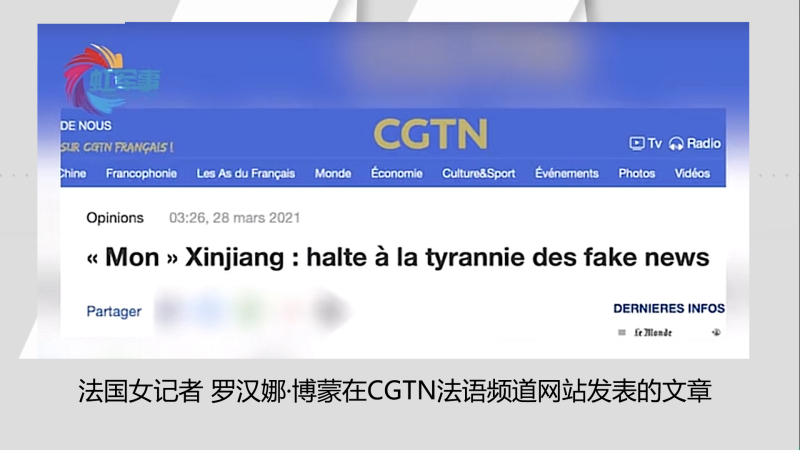
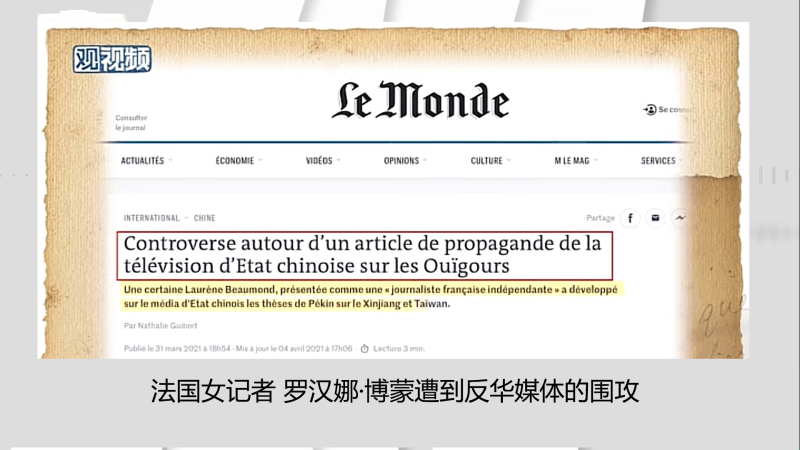
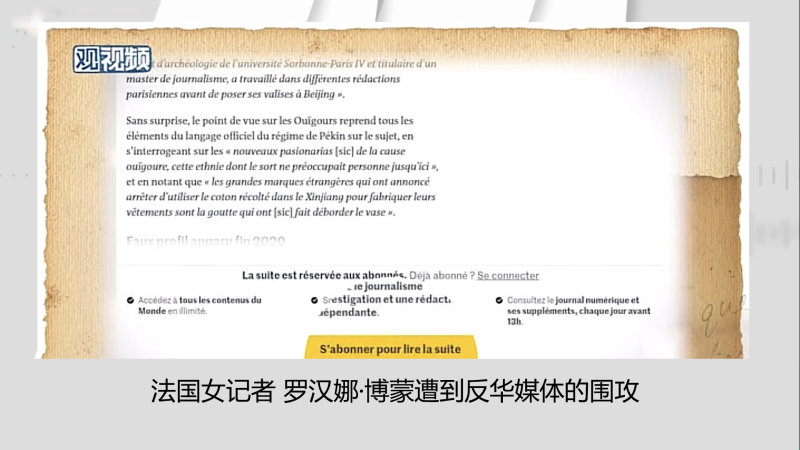
For another example, in April 2021, the U.S. Project Syndicate said that most of the allegations of “genocide” in Xinjiang came from false reports, one of which was issued by the research institute for innovation strategy and policy in the United States. This institute belongs to a “bogus university” with only eight teachers and a strong conservative tendency. For example, an Ethiopian Newspaper Herald published a commentary article The Storm of Lies in The West Is Aimed at the East, which said that under the cover of western forces and media, some “toxic” communication machines put on the cloak of human rights and media organizations, wantonly uttered their voices in an attempt to hinder the development of newly emerging countries and even completely control other governments. The lens can describe the facts in a distorted way, which is the way that the western media preach and concoct the so-called “human rights violations”, “genocide” and “crimes against humanity”. The reports of western media on China’s Xinjiang issues are misleading the world in the same way as their usual trick.
Xu Guixiang: Now I would like to talk with you on some issues.
Recently, some media reporters said that they interviewed three respondents who said Uygurs had been subjected to torture and ill treatment in detention facilities in Xinjiang. They also mentioned some people. I’d like to brief it.
Firstly, Abuduwaili Ayoufu said that his niece Mire’ayi Ai’erken died in the detention center after returning to Xinjiang from Japan in the summer of 2019. This is not true at all. In fact, his niece Mire’ayi Ai’erken is a Uygur woman from Shufu County, Kashgar Prefecture. She graduated from Shanghai Jiaotong University in 2014. On September 15 of the same year, she went to the University of Tokyo to study as a postgraduate majoring in Biology. On June 19, 2019, she suspended school due to illness and returned home for treatment. On December 19, 2020, Mire’ayi Ai’erken died of organ failure caused by severe anemia in spite of a rescue doned by Kashgar Far East Hospital. Mire’ayi Ai’erken was hospitalized until his death and was accompanied and attended to by his uncle Maimaitiyiming Ayoufu and his younger brother Mi’erxiaatijiang Ai’erken.
Secondly, Wumai’er Baikeli said that during his detention in Karamay, he was subjected to a torture to extract a confession and was forced to admit that he incited terrorism while working in a travel agency. He also claimed that his whole family had been detained and that his father died during the detention. In fact, the “persecution” on Wumai’er Baikeli and his relatives by the Chinese government is completely fabricated, and is a sheer slander. From March 26, 2017 to November 24, 2017, Wumai’er Baikeli was investigated by the public security organ in accordance with the law on suspicion of organizing, leading and participating in terrorist organizations. The public security organ found out that Wumai’er Baikeli has repeatedly encouraged, abetted and funded others to participate in terrorist organizations. In June 2006, he contributed 22,000 dollars to funding overseas “Jihad” elements. During the investigation in accordance with the law, the public security organ guaranteed his rights according to law and arranged consular visits by consular officials of relevant embassies in China on July 1, 2017. On November 24, 2017, he was relieved of the compulsory measures and ordered to leave China within a time limit. On December 4, 2017, Wumai’er Baikeli left China. His mother, brothers and sisters are Chinese citizens and are now living a normal life. His father died of illness (advanced liver cancer) in the hospital on September 18, 2018, which could be proved by the hospital.
Xu Guixiang: Now, reporter from China News Agency, your question please.
China News Agency: At today’s press conference, Xinjiang focused on displaying the positive voices of insightful people in the international community, and highly praised them. However, as far as we know, Jane Golley, director of The new Australian Centre on China in the World of The Australian National University, was forced to resign because of her positive remarks related to Xinjiang. What’s your comment?
Xu Guixiang: We have also taken note of this news. Jane Golley exposed the possible problems in the reports of western media such as Australia and the United States and other western countries on “1 million Uygurs in Xinjiang are detained in concentration camps”, “forced labor” and “genocide”, and advocated to play down the remarks that “Uygurs in Xinjiang are subjected to oppression”. This led to continuous verbal abuse and slander from some Australian academic and public opinion institutions against her. At present, Jane Golley has resigned from her post as director of the research center. In her speech, Australian scholar Jane Golley claimed that there might be problems in the reports of western media, saying that the western mainstream reports of rumors and smears were inconsistent with the facts, which directly led to her being forced to resign. For example, the French writer Maxim Vivas was harassed and abused by many American and western media for publishing the book Ouïghours, pour en finir avec les fake news.
These people of insight only spoke the facts and truth they had seen. However, they were besieged and threatened by the western media. This is because the correct statements of Jane golly and Maxim Vivas threatened their interests, which suggests that they can’t tolerate different voices against themselves! This is a big satire of the so-called “academic freedom” and “freedom of speech” in the United States and the west, and once again exposes the hypocrisy of the “academic freedom" and “freedom of speech” they have always advocated.
Xu Guixiang: Now reporter from MASTV, please ask your question.
MASTV: Recently, China Jinko Energy Co., Ltd. said that the U.S. Customs and Border Protection(CBP) seized some of the company’s solar panels on the ground that they may contain materials produced by “forced labor” in Xinjiang. Can Xinjiang brief us on it? What’s Xinjiang’s comment on it?
Xu Guixiang: As for this issue, Elijan Anayat, spokesman of the Government of Xinjiang Uygur Autonomous Region will make comments.
Elijan Anayat: The U.S. CBP’s wanton seizure of products of Chinese enterprise on the ground that they may contain materials produced by “forced labor” in Xinjiang is entirely a wrong move based on lies and false information. Its real intention and sinister purpose is to suppress the photovoltaic industry in Xinjiang, China and disrupt the stable development of Xinjiang. Here we express our strong condemnation and resolute opposition to it!
It must be pointed out that the existence of “forced labour” can not be determined by the subjective assumptions of some countries and institutions. The international community has had a clear definition of this issue far past. The Forced Labor Convention adopted by the general conference of the International Labor Organization in 1930 defines “forced labor” as “all work or services which is exacted from any person under the menace of any penalty and for which the said person has not offered himself voluntarily”. Xinjiang photovoltaic enterprises always include the protection of labor rights into the basic contents of safeguarding human dignity and human rights. They practice in strict accordance with international labor and human rights standards, focusing on creating a fair, free and guaranteed employment environment. They ensure that workers of all ethnic groups enjoy equal employment opportunities and labor rights and interests in accordance with the law, and strive to enable workers of all ethnic groups to obtain decent work, realize their own development, and create a better life. Most of the employees of all ethnic groups in the enterprise are engineers and technical workers with professional knowledge and skills. They come to the enterprise for employment through online recruitment, campus recruitment, human resources market and other channels, sign labor contracts with the enterprise according to law, establish labor relations protected by law, and fully enjoy the right to labor remuneration, rest and vacation, labor safety and health protection, social insurance and other rights. Their religious beliefs, ethnic customs, languages and other rights and interests are also respected and protected according to law. There is no “forced labor” at all. As far as I know, Xinjiang photovoltaic enterprises have rank themselves into the world-class list and achieved a high degree of automation and digitization. Most operations are completed by computers, and there is no need for “forced labor”.
Many countries generally agree that it is very significant to promote energy reform and the development of renewable energy represented by photovoltaic. Today, in the context that countries have increased their climate commitment goals, we need more cooperation and healthy competitions, rather than political repression and malicious smear. Under the pretext of so-called “forced labor”, some American institutions restrict and suppress China’s photovoltaic enterprises, especially those in Xinjiang, interfere in normal commercial cooperation and competition, and seek private interests from it. They not only seriously violate international trade rules and market economy norms, undermine the international economic order, but also seriously threaten the security of global industrial chain and supply chain, which will ultimately bring harm to the interests of enterprises and consumers in various countries, including the United States.
Here, we urge the U.S. agencies to respect the facts, abandon prejudice, stop political manipulation, revoke the wrong decision of sanctions, eliminate the negative impact, and not to go further on the wrong path. At the same time, we make appeal to industry associations and enterprises all over the world to resolutely resist unfair competition, strengthen cooperation and make concerted efforts to jointly promote the healthy development of the global photovoltaic industry.
Xu Guixiang: Thanks to media friends for your attendance. Thanks to the speakers. This is the end of press conference for today. Thank you! bye!








